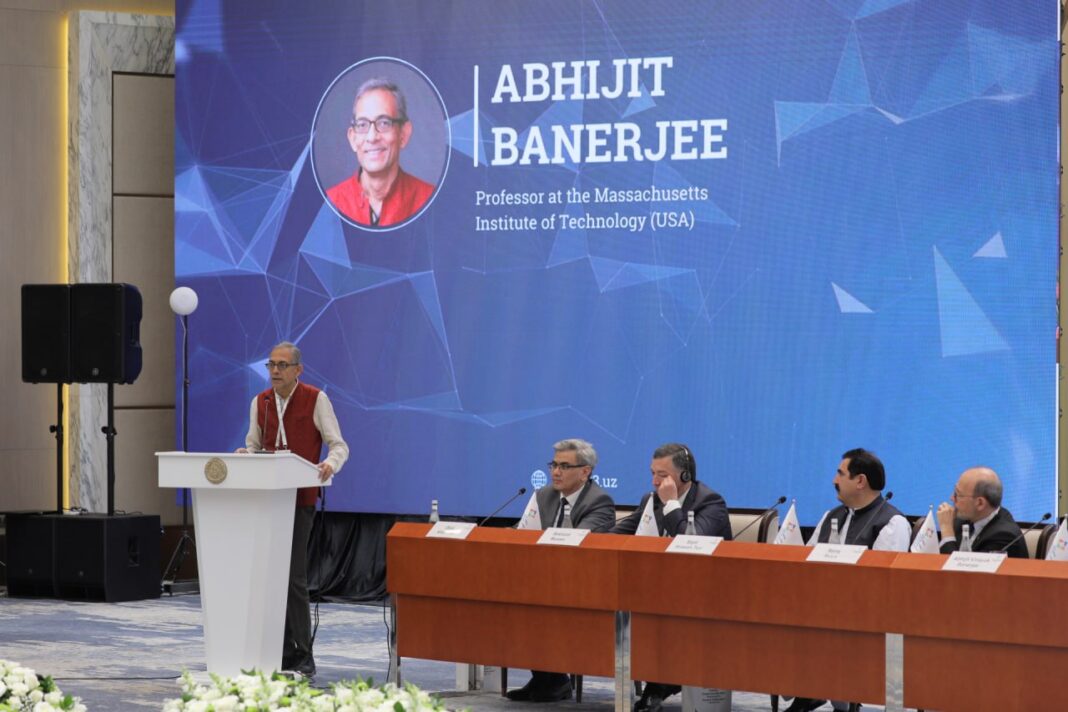In Tashkent, the Hilton Tashkent City Hotel hosted the II International Forum on the topic: “Implementing of best practices in poverty reduction“, organized by the Center for Economic Research and Reforms (CERR) jointly with the Ministry of Employment and Poverty Reduction of the Republic of Uzbekistan (Ministry of Employment), with the support of the United Nations Development Program (UNDP) in Uzbekistan and the United Nations Children’s Fund in Uzbekistan (UNICEF).
Alfred Nobel Prize Laureate, co-founder of the global initiative to combat poverty J-PAL — Abhijit Banerjee addressed the Forum participants with a greeting.
The expert noted that governments around the world are strengthening their social protection programs in response to the coronavirus pandemic, in particular, about 3,856 programs have been planned or implemented to date.
“Speaking, for example, about Uzbekistan, the tools that are used to create social programs, how do you determine the right target audience, what they need, how do you support them, how do you support entrepreneurship, how do you separate the poorest and those who need start-up support. The fact that you understand that different target audiences need different solutions to problems, and how effective the various programs adopted are, how the education system works — all this is quite difficult work, but I am glad that your country shows example to other countries how to fight poverty. Standing here today, I feel the spirit of in this country and I am proud that I can say “let’s do it,” the expert said.
In his presentation, Abhijit Banerjee noted that when expanding access to programs and benefits, many countries relied on existing programm platforms, demonstrating how important investments in social protection systems and institutions are. J-PAL researchers evaluated social protection programs in India, Bangladesh and Ghana, as well as in other countries. According to Abhijit Banerjee, well-designed randomized assessments can test specific hypotheses and identify their cause-and-effect relationships. They give a deep insight into the mechanisms that can change the situation, and their results can surprise all of us.
Speaking about the social programs accepted in the world, Abhijit Banerjee said that very little is known about which programs really work and which do not. At the same time, decisions on the implementation of such programs are made intuitively rather than on the basis of actual data. The expert noted that India has the largest number of people in the world living in multidimensional poverty (25% of the country’s population).
Abhijit Banerjee noted that economic theory is only a starting point in the development of effective policy.
“Economic theory is based on assumptions, it does not give a complete picture of the real situation, and assumptions are often unverifiable and unstable. At the same time, economic models warn us very well about various possible mechanisms, but they do not tell us which of these mechanisms actually work and which do not. However, there are various effective solutions taking into account economic efficiency,” the expert noted.
Speaking about proven mechanisms in the field of education, the expert noted three promising approaches: 1 – support for students with low academic performance through a remedial training program; 2 – providing additional training materials using machine learning; 3 – focusing on a specific skill using the “Read-a-thon” program to improve reading skills.
The expert also touched upon the impact of ecology on the level of household well-being. He noted that indoor air pollution poses a serious threat to health worldwide. For example, about a third of households in the world use fossil fuels, including coal. Women and young children are disproportionately affected by the resulting indoor air pollution.
What possible solutions come to mind? Installation of improved kitchen stoves and hoods in households, as well as the use of more environmentally friendly fuel. However, will improved stoves be able to have a positive effect on health? Will they consume less fuel and will there be less emissions into the atmosphere? Do people agree to use them? The results of a randomized study in India showed that improved kitchen stoves did not improve health indicators due to low consumption. One of the reasons is that households did not use the improved stoves regularly andior properly.
“It is important to understand how new technologies fit into the lives of people in poor households. For example, kitchen stoves could not be taken outside, which could explain why people refused them. A randomized trial was the right method to find answers to these questions, as they allow us to test a specific hypothesis, measure causal effects, and understand the mechanisms of interaction. It is encouraging to see that over the past two decades there has been a significant increase in the volume of thorough assessments in the measurement of multidimensional poverty and significant progress in the use of evidence for public policy decisions. So, our 20-year work on evidence-based research and policies has affected the lives of 600 million people around the world,” the expert noted.
Abhijit Banerjee spoke about possible areas for conducting evidence-based research in Uzbekistan:
- What design elements can make social protection programmes more effective? As Uzbekistan increases its investments in social protection, it is useful to evaluate the targeting of these measures and other design features to ensure they are reaching the right people and producing the desired impacts.
- What sorts of entrepreneurship support are most effective? Can we find ways to identify high-potential entrepreneurs who could benefit from additional support? How do new entrepreneurs respond to different tax incentives? What measures may be particularly effective for supporting female entrepreneurs?
- What forms of vocational training are effective in helping successfully match workers to jobs? What formats are most cost-effective for supporting successful employment outcomes? What other support may workers need beyond training?
- How can the quality of schooling and educational performance be improved? What kinds of pedagogical interventions could be useful in improving primary and secondary educational outcomes? As access to pre-school increases, what other measures may be needed to encourage enrollment and improve quality?



